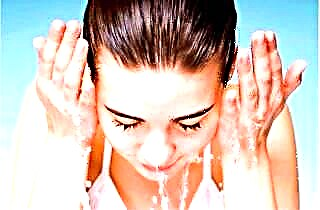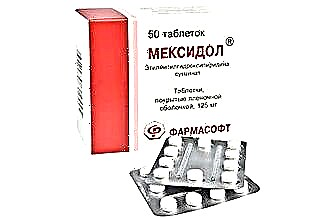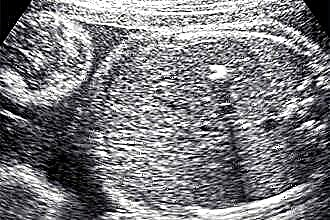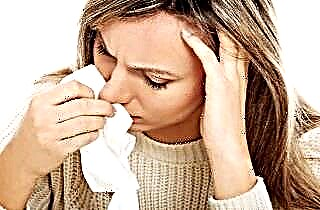Herpes is a common viral disease, it is very easy to get infected, but it is already impossible to get rid of it forever. Once settled in the body, the virus attacks the nervous system and skillfully hides, disguising itself as various diseases. But in the active stage, it is very recognizable, since it has characteristic symptoms and limited localization. Most often, herpes nests in the nose, on the lips and on the mucous membranes of the genitals.
How to recognize herpes
 Among the people, herpes that pops up on the lip or near the nose is often called a "cold" and it is not just that. The main signs of primary infection are:
Among the people, herpes that pops up on the lip or near the nose is often called a "cold" and it is not just that. The main signs of primary infection are:
- an increase in body temperature, sometimes significant;
- muscle and joint pain;
- general weakness, dizziness;
- loss of appetite;
- a sharp deterioration in the general condition.
It looks a lot like influenza or ARVI, doesn't it? After a while, usually a day or two, these symptoms disappear, and severe itching begins on the lips or nasal mucosa and a burning sensation is felt. A few hours later, multiple small bubbles filled with a transparent liquid appear at this place.
When the bubbles burst, rather painful sores form instead. If they are not constantly combed, they will soon dry out and become covered with a dense crust. It can last up to several days, and then disappears on its own. A period of remission begins, and the virus does not manifest itself in any way until the next exacerbation.
External negative factors can provoke the activation of the virus: severe hypothermia, physical or chemical irritants, highly polluted or polluted air. And sometimes internal reasons are connected: exacerbation of chronic diseases, injuries or previous operations. In general, anything that can significantly weaken the immune system.
If herpes has not been treated, then basically it appears constantly in the same places. And after treatment, he can change the selected location and jump out in a new place.
Prevention of infection
It is important to know that in the active stage, the herpes virus is highly contagious, although it is rarely transmitted by airborne droplets. To do this, someone has to inhale droplets of contaminated saliva, which can happen, for example, when sneezing, when it flies several meters. To get herpes during a conversation, the other person's face must be literally a few centimeters from your nose.
 Much faster "pick up" it can be through the exchange of fluids, objects of common use and with close tactile contact. The easiest way for a virus to enter the body is through the mucous membranes. Even the conjunctiva of the eyes can be affected if you touch the herpes in your nose and then rub your eyes with your hands.
Much faster "pick up" it can be through the exchange of fluids, objects of common use and with close tactile contact. The easiest way for a virus to enter the body is through the mucous membranes. Even the conjunctiva of the eyes can be affected if you touch the herpes in your nose and then rub your eyes with your hands.
Therefore, in order not to harm the family and the immediate environment, during this period, precautions must be taken.
- Provide separate dishes, a towel and bedding for the patient to use.
- Do not touch the resulting bubbles and wounds with your hands; carry out the entire treatment using cotton swabs.
- Do not scratch blisters or peel off dried crusts so that the infection does not spread further.
- Completely exclude all intimate contacts, kisses on the lips.
- Thoroughly wash your hands with soap, and it is better to treat with an antiseptic after the performed medical procedures.
- If your cold sore flares up during a cold, it is advisable to wear a gauze bandage so that infected saliva does not scatter around the room when you cough or sneeze.
- It is imperative to do wet cleaning every day and wipe all surfaces that the patient could touch with an antiseptic: doorknobs, a landline telephone, a TV remote control, etc.
If there is a small child in the family, then it is better, if possible, to completely protect him from communication with an infected family member. When this is unrealistic, contact with him only in a bandage covering the face and with hands previously washed and treated with an antiseptic. These rules are relevant until all the external symptoms of herpes completely disappear.
Why herpes is dangerous
In principle, herpes in the nose is not a dangerous disease. You can easily live your whole life with him without any complications. But if the ulcers are not treated with medications or do not fight them with folk remedies, the acute phase of the disease can last for 2-3 weeks, during which they will spread through the nasal mucosa.
Also, if the above precautions are not followed, there is a high risk of self-infection. When you touch your hands to other parts of the body, especially mucous membranes: genitals, eyes, lips, the virus from the nose can easily move to new areas. There, at first, the same symptoms as in the nose will begin to be felt: burning, itching, pain, and soon bubbles and sores characteristic of herpes will appear.
In rare cases, with a strongly weakened immunity and complete absence of treatment, the herpes virus can cause severe damage to the nervous system, attack the meninges, cause visual impairment, and damage the optic nerve. To avoid this, it must be treated simultaneously from the outside and from the inside, taking antiviral drugs.
Active form treatment
Modern drugs against herpes can completely eliminate the risk of serious complications and significantly reduce the duration of the active phase. However, they are not able to prevent a re-exacerbation. Therefore, treatment should include:
 Antiherpes drugs: "Acyclovir", "Gerpevir", "Zovirax" and others in the form of tablets and ointments. The tablets are taken orally in accordance with the instructions, the ointment is applied 3-4 times a day to the affected skin on the nose, capturing 1-1.5 cm of intact skin in all directions.
Antiherpes drugs: "Acyclovir", "Gerpevir", "Zovirax" and others in the form of tablets and ointments. The tablets are taken orally in accordance with the instructions, the ointment is applied 3-4 times a day to the affected skin on the nose, capturing 1-1.5 cm of intact skin in all directions.- Drying ointments: zinc, sulfuric, tetracycline (with severe inflammation and suppuration). To dry the crusts, you can use applications made from natural essential oils: eucalyptus, tea tree, celandine, St. John's wort, coniferous or camphor alcohol.
- Immunomodulators: Echinacea extract, ginseng or homeopathic remedies. They increase the activity of the immune system and help to neutralize the virus faster. It also serves as a good prevention of its re-exacerbation.
The use of folk methods such as validol, earwax, etc. is undesirable, since there is no exact information about their high effectiveness. Therefore, whether it is worth experimenting with your own skin - everyone decides for himself. But it is better not to forget that if the wounds are too deep, ugly marks may remain after them.
Disease prevention
Since having contracted herpes once, a person remains its carrier all his life, it is advisable to do everything to prevent this insidious neighbor from entering his body. Of course, no measures can be taken to guarantee 100% that infection will not occur. Through saliva and blood, the virus can be obtained even from a person in whom it is now in an inactive stage. The likelihood of such infection is lower, but it is still present.
So what can you do so that one day you do not find symptoms of herpes on your nose or other parts of the body:
 take measures to strengthen the immune system as much as possible: exercise, hardening procedures, more often to be in the fresh air;
take measures to strengthen the immune system as much as possible: exercise, hardening procedures, more often to be in the fresh air;- regularly ventilate work and living quarters, especially if there are always a lot of people in them;
- do not use other people's personal belongings, and even more so, hygiene and skin care products;
- be sure to wash your hands after visiting public places and especially toilets;
- if possible, treat public items that come into contact with the person (handsets, headphones, etc.) with antiseptic wipes;
- try to stay away from sneezing and coughing people, in public transport - turn away so that saliva does not get on your face;
- during the period of massive ARVI or influenza diseases, do not attend entertainment events and crowded places, and when necessary, use a gauze bandage;
- at the first symptoms of herpes, take an anti-herpes drug and treat the place where itching is felt (you can lubricate it with essential oil);
- provide yourself with nutrition rich in vitamins, minerals and trace elements, and when it is difficult - take multivitamin preparations 2-3 times a year.
If the herpes in the nose still popped up, preventive measures must be taken so that the virus does not spread to other parts of the body.
Remember that going to a doctor with a problem like herpes is useless. Medicine has not yet discovered a remedy that can completely kill this virus or remove it from the body. So this is just the case when you have to help yourself on your own, and even take care that others do not suffer.

 Antiherpes drugs: "Acyclovir", "Gerpevir", "Zovirax" and others in the form of tablets and ointments. The tablets are taken orally in accordance with the instructions, the ointment is applied 3-4 times a day to the affected skin on the nose, capturing 1-1.5 cm of intact skin in all directions.
Antiherpes drugs: "Acyclovir", "Gerpevir", "Zovirax" and others in the form of tablets and ointments. The tablets are taken orally in accordance with the instructions, the ointment is applied 3-4 times a day to the affected skin on the nose, capturing 1-1.5 cm of intact skin in all directions. take measures to strengthen the immune system as much as possible: exercise, hardening procedures, more often to be in the fresh air;
take measures to strengthen the immune system as much as possible: exercise, hardening procedures, more often to be in the fresh air;

